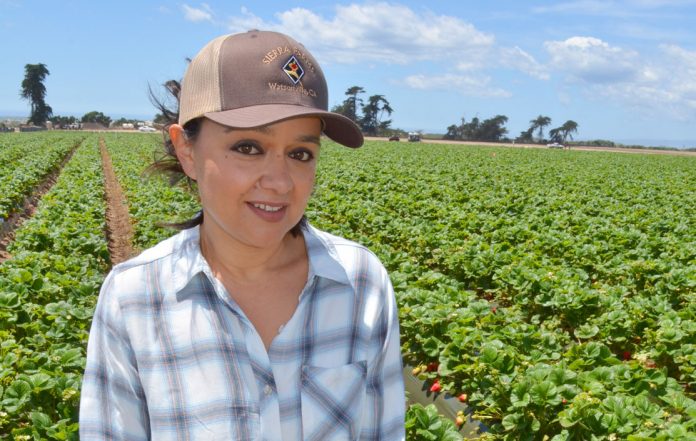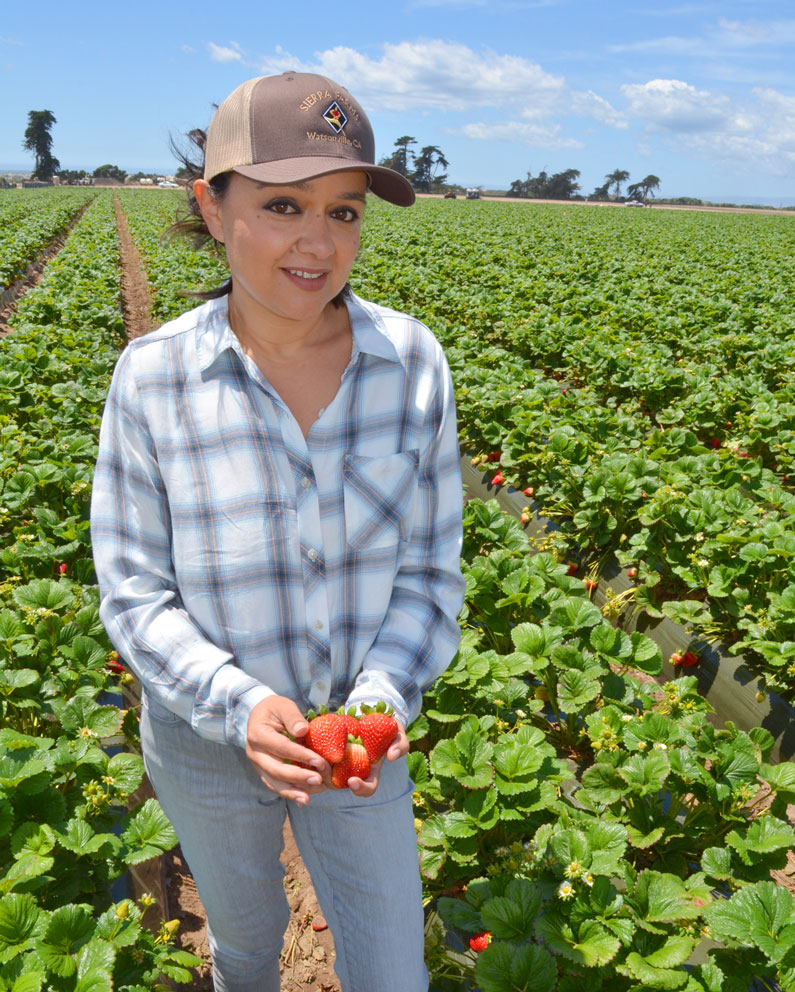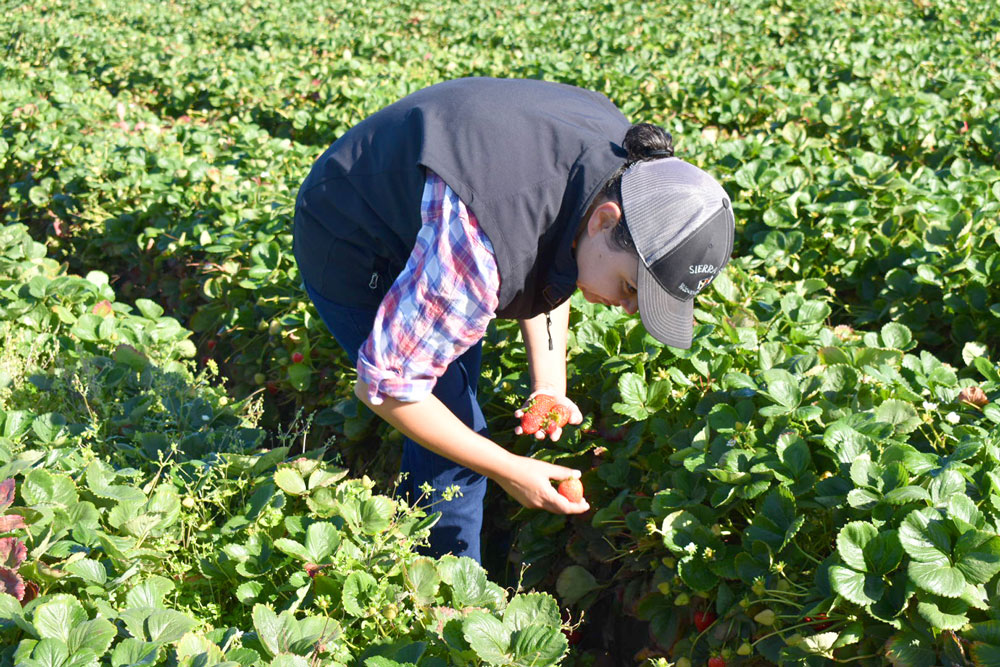
Editor’s Note: The following profile is an excerpt from Amy Wu’s upcoming book, “From Farms to Incubators: Women Innovators Revolutionizing How Our Food is Grown,” which tells the stories of women entrepreneurs who are transforming agriculture through high technology.
Jackie Vazquez spends the majority of her workday in the fields, walking the vast landscape of strawberries that are bookended by the Pacific Ocean and Cypress trees that the Central Coast is known for. She’s examining the quality and quantity of the berries, and it is also a way to connect with the crew including fieldworkers.
As head of operations for Sierra Farms – A Good Farms Operation, a strawberry grower in Moss Landing, she oversees roughly a dozen farm managers who — depending on the season — manage a crew of upwards of 1,200 production staff. She’s charged with some 400 acres, which — depending on the time of year — is a mix of strawberries and raspberries.
The work is year-round, intense and the farm (a grower and shipper) is known for supplying major retailers such as Costco and Kroger. While there’s no official work attire, in many ways, she fits in as one of the guys on the farm with her jeans, a vest, plaid shirt, boots and a hat to shield her from the heat and sun.
Vazquez is an anomaly, one of the few women who head operations at a mid-sized farm. It is a dirt and boots sort of job where she juggles both business and farm operations.
She was born in Patterson in Central Valley, California, and raised in Watsonville, a city north of Salinas, known for its strawberry industry and annual Strawberry Festival. Her parents went from being farmworkers to running a chain of grocery stores (the one remaining is La Esperanza Mercado) where most of their customers were farmworkers.
Vazquez dropped out of the University of Chicago, where she was studying business and marketing, after a family emergency. She fell into the agriculture industry after accepting an administrative assistant job at a farm, which is where she came to learn more about the industry and the ins and outs of farming.
As of 2020, she’d been in the agriculture industry for 14 years, six of the most recent at Sierra Farms.
When not on the farm, she spends a considerable amount of time with family including her four sisters and father (her mother passed away in 2016 of breast cancer). She and her husband, a graphics designer, are hands on in raising their two children aged 10 and 7.
Vazquez is a member of the PTA and during the Covid-19 pandemic they split shifts in home schooling the children.
She jokes and says she and her husband are polar opposites.
“He is very much the creative one and I am very much the one who is two plus two equals four,” she laughs. “I am black and white with gray and my husband is every color.”
I first met Jackie when Dennis Donohue, head of the Western Growers Center for Innovation and Technology (WGCIT), connected us. In late 2018 I visited her at work where I had a chance to see what she does for a living, and walk the berry fields with her. Here she talks about how she ended up managing a farm and what she loves about agriculture.

Does agriculture run in the family?
Vazquez: My parents started a grocery store but for years they worked in agriculture themselves. My parents met at a flower nursery so they were in agriculture ever since they immigrated to this country and then they moved into running their own business. My parents ran a chain of grocery stores for many years here locally in northern California, and most of our customers — at least 99 percent — were agricultural employees. I grew up knowing the difference in the farmers’ paycheck(s), I could see the checks that were coming in every time and the groceries that they bought and I could see the struggle that would happen in the winter (when they would be laid off). We knew starting December and January sometimes it would be on credit. We’d be giving people groceries on credit and they would be paying it back in March or April.
How did you end up working in agriculture?
Vazquez: I got my first job in agriculture on a whim and they said they liked the way I talked and I am also bilingual. It was an administrative job and slowly but surely, I started taking on more and more things. People sometimes ask me how do you step in the ladder of a job and I say “don’t be afraid just raise your hand and take things on and really volunteer for things, especially if you’re not educated in that sense, try to put yourself out there and you have the spirit of yes.” I was part of a really good team and worked with 10 to 12 men in the industry and I was always taking notes. Anytime they’d say words I didn’t know, I underlined the words; I always thought it was so awesome they’d take me to the field. Maybe I’d spend one day on the field and I’d then say I’d like to be involved in organic certification. It was one day or two or three days in the field and then it started to go the other way.
What is your main job?
Vazquez: Being out in the fields and looking at the quality of our produce with our managers, and seeing that our crews are out doing what they are supposed to be doing. I am doing estimates for sales, and then managing the profit/loss margins and looking at the budget part of operations. I am making irrigation decisions with our input manager, meaning, hey do we need to invest in more technology, what kind of irrigation meeting with scientists are needed if we have issues on the fields, so basically all aspects of growing and all aspects of running the business would be under my responsibility.

Would you agree that gender plays a role in the industry?
Vazquez: Yes, and no. I think attitude and demeanor are part of it. I will show myself right away (being in the fields and with the workers) and I think that has helped. For me the most difficult has been the cultural aspect of it. One reason it hasn’t been as great of an impact is because I understand it if you take a very culturally Hispanic man, especially if they are older, they aren’t prepared for it (a woman being in charge). Because I am a Hispanic woman and I’ve seen it in the culture I grew up in, I’ve learned how to navigate it (being one of the few female farm operation managers) without feeling victimized, I’ve learned how to navigate it to make it better for myself, and how to show women around me how to navigate that without having to have a constant battle.
How have you handled these cultural challenges?
Vazquez: For me it’s going slow and not demanding respect without giving respect back. You have to give respect to get respect, and if they don’t give it back to you, there’s a different conversation that needs to be had whether or not you’re a woman or not. For me one of the easiest things is to go on and prove what I am saying. If I am saying hey, I am the woman in charge then I am going to be OK with getting dirty and getting on a tractor. I am going to be OK with doing the things that I am asking people to do because if not, then I am not asking for equality — I am asking for special treatment.
What’s your outlook for the future when it comes to women in agtech?
Vazquez: Right now, there’s more of a push to talk about it (disparity of women) but I think it’s because there’s more of a push for women in everything — it’s just agriculture’s turn right now. I definitely see more and more women graduating from Cal Poly and U.C. Davis and a lot of women I see going into ag are still going the food safety route and ag science, so I definitely see an increase of women in ag, but I haven’t seen a big growth of on-the-farm, boots-on-the-ground women in agriculture.
What inspires you to do what you do daily?
Vazquez: The idea of what we do is really feeding the world — that you have a direct impact on the consumer every single day you meet a basic need, which is very hard to do. Right now, for example, we are in a different time but right away farmworkers were considered essential regardless of the politics. Doing that work daily and knowing that product goes to a family — that just does something to me.
Amy Wu is an award-winning journalist and author of “From Farms to Incubators,” scheduled to be released on April 20 by Linden Publishing. For more information, go to farmstoincubators.com.













